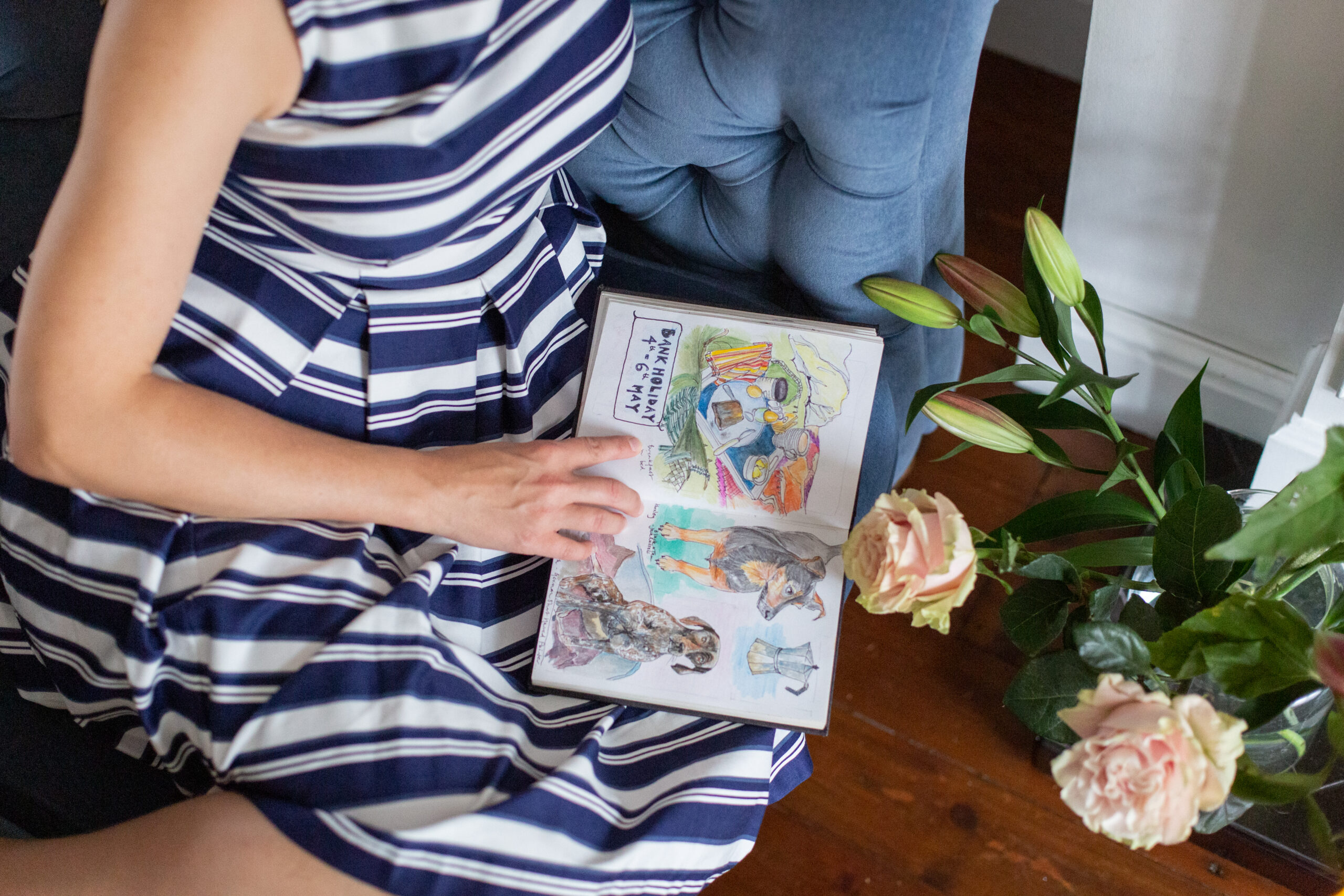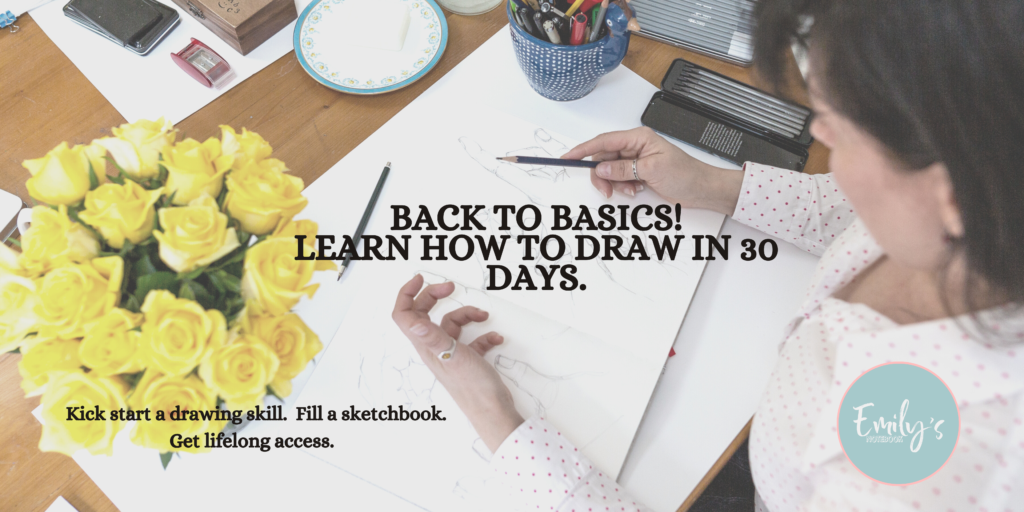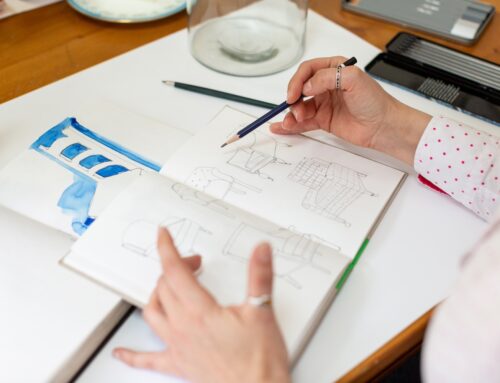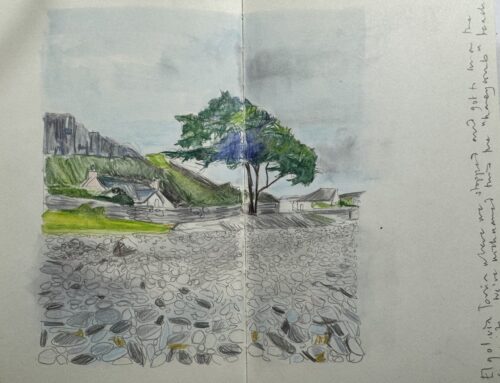How exactly can drawing improve your mental health?
I believe it does so from two different perspectives which include;
- The consistent practice of daily drawing and building a creative habit, i.e the process you go through.
- Directly impacting on our well being through the “feel good factor.”
If you struggle with well being or are perhaps realising that the simple act of drawing can have a big impact on it, read on to explore some of the solutions I myself have developed over time.
“Art is the greatest asset to mental health I have; it has this amazing ability to go under the radar and it goes down little pathways which are un-trodden and yet it’s still a very legitimate way of thinking and feeling and getting on with your life.” Grayson Perry
Can keeping a daily drawing habit in the page of a sketchbook improve your mental health? Can the process your brain undergoes whilst drawing make a difference to how you feel?
A lot happens in our brains when we draw, doodle or take a pen or pencil to paper. We are all designed to be creative. Creativity supports us stay connected to ourselves and to the world around us.
The simplest and quickest form is via just picking up that pencil and having a go, learning some basics and keeping a sketchbook to practice them in daily.
At least that has been my experience.
In its simplest of forms a sketchbook we can fill with our drawings supports us connect with what we see around us and encourages us to interpret what we see on paper.
How can a drawing improve our mental health in 10 ways?
- Filling up pages or paper or a sketchbook, (like you would a journal, with drawings and colour, as well as documenting as you go,) is a satisfying thing to look back upon. You feel good because you have achieved something that is added to daily, grows the more you do it, and boosts your confidence.
- Your technique, style and skill level will increase the more you practise. Focusing on practising technique and skill can support you establish some control over a creative process. So often, one of the debilitating challenges of a mental health condition are feelings of powerlessness. Empower yourself with a pencil and piece of paper.
- Expression and communication without the need to say anything, or justify yourself to anyone, as well as keep your expression private. The irony of course is that you still feel able to communicate, but on paper.
- No set structure or rules or, even better, expectations.
- Supports resolve problems. Believe it or not you are training your brain to make decisions whilst you sketch. It’s the basis of modern-day art therapy. You subconsciously imagine possibilities and solutions to issues as you create on the paper without realising you are doing so – even if you don’t have a precise answer as to how to resolve them. You follow a process of thought. I can testify that this creative process and way of thinking is applied to other areas of my professional or personal lives.
- Reduces stress by lowering cortisol.
- When you sketch you trigger a relaxed state as well as a focused one. To sketch you sit still!
- You create pleasurable memories. Often when I flip back through my sketches it’s like looking through a photo album. I remember the smell, sounds, and feelings I was experiencing at that moment. (My little girl turning cartwheels in the summer, a plate of fish and chips, a trip to the allotment through a field full of cows…)
- Retain information. Isn’t it crazy to think that sketching can support you capture information and, in some cases, improve your memory? Artists exercise parts of their brains that activate memory and concentration through looking at something for extended periods of time, truly studying it and then translating it onto paper.
- An ability to forget a sense of self for a while by focusing on a something else entirely. Sketching enables you to press the pause button and focus on deconstructing something other than yourself for a while.
Over the past few weeks I have been reading the Power of Now by Eckhart Tolls. In it he explores how we can better live in the present moment, not focus on our past baggage or try and predict the future through worrying. We spend too much time on “what ifs” and not on the present moment. Speaking from experience, my personal well being is often determined by A) worrying about things that have not yet happened and B) things that I can no longer change but must let go of.
There is no better daily practice of drawing that can empower you to appreciate and live in the power of now. On reflection across my personal journey I kept a daily sketchbook and simply drew things across my day in journal format. Twenty minutes of lifting myself out of my present worries and concerns. Concerns that I realised as I was drawing were manageable challenges or non entities. Creating the space in which to live in the present enabled me to step off the daily grind and, oddly, subconsciously assess my “present.” Empowerment emanated from the pages of my drawing. I was able to take pleasure in how good I was getting at drawing and truly enjoy the process.
If you are looking to take up a drawing habit to support your mental health here are some starting guidelines;
- Make a commitment to sketch daily. You might want to build it into a part of your day where you know you might struggle. For example, in the evening during winter months.
- Make a list of your favourite things and start sketching those. (An object / a place / a pet / a person.) List 10 things.
- Join a network of artists on line or start following those that inspire you with their style.
- If you feel confident enough – share your work with one person or many! Encouragement will give your morale a boost.
- Tell your story through a series of sketches!
- Book onto a basic drawing course to improve your technique and meet others within a community.
I love Grayson Perry’s quote about how art “has this amazing ability to go under the radar and it goes down little pathways which are untrodden.” It is completely impossible to even begin to document the restorative power of exploring ones creative side through the art of sketch-booking.
As a result of the process I have been through, a large part of my teaching practice revolves around empowering, strengthening and focusing the mindset with which we create. Its a huge part of our success! Are you aware of the mindset you have when it comes to creating – are you complacent, do you procrastinate, believe in negative words that have been spoken to you in the past about your creativity, lack motivation, or fear starting the first page of your sketchbook? We all have our psychological blocks when it comes to being creative that if unresolved will lead you to miss out on the creative you’re meant to be.
Realise the mindset that you carry in order to start the process of becoming the creative you’re meant to be today!
As always, keen to hear from anyone who turns to their drawing and sketchbook to support their mental health.








